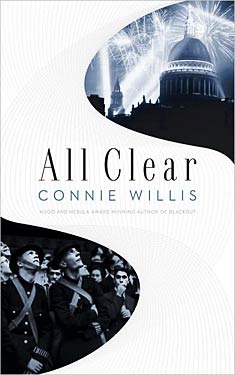
Added By: Administrator
Last Updated: Administrator
All Clear
| Author: | Connie Willis |
| Publisher: |
Spectra, 2010 |
| Series: | Oxford Time Travel: Book 5 |
|
1. Fire Watch |
|
| Book Type: | Novel |
| Genre: | Science-Fiction |
| Sub-Genre Tags: | Time Travel Alternate History (SF) Near-Future |
| Awards: | |
| Lists: | |
| Links: |
|
| Avg Member Rating: |
|
|
|
|
Synopsis
In Blackout, award-winning author Connie Willis returned to the time-traveling future of 2060-the setting for several of her most celebrated works-and sent three Oxford historians to World War II England: Michael Davies, intent on observing heroism during the Miracle of Dunkirk; Merope Ward, studying children evacuated from London; and Polly Churchill, posing as a shopgirl in the middle of the Blitz. But when the three become unexpectedly trapped in 1940, they struggle not only to find their way home but to survive as Hitler's bombers attempt to pummel London into submission.
Now the situation has grown even more dire. Small discrepancies in the historical record seem to indicate that one or all of them have somehow affected the past, changing the outcome of the war. The belief that the past can be observed but never altered has always been a core belief of time-travel theory-but suddenly it seems that the theory is horribly, tragically wrong.
Meanwhile, in 2060 Oxford, the historians' supervisor, Mr. Dunworthy, and seventeen-year-old Colin Templer, who nurses a powerful crush on Polly, are engaged in a frantic and seemingly impossible struggle of their own-to find three missing needles in the haystack of history.
Told with compassion, humor, and an artistry both uplifting and devastating, All Clear is more than just the triumphant culmination of the adventure that began with Blackout. It's Connie Willis's most humane, heartfelt novel yet-a clear-eyed celebration of faith, love, and the quiet, ordinary acts of heroism and sacrifice too often overlooked by history.
Note: Blackout and All Clear are regarded as being a single large book split into two volumes for award purposes. We have assigned the award nominations to Blackout, the first of the two volumes, so that we list the same number of awards as Connie Willis has statues on her mantle.
Excerpt
Well, he hasn't come yet, sir, he's more than a bit late tonight.
--London Porter to Ernie Pyle, referring to the German Bombers
London--26 October 1940
By noon Michael and Merope still hadn't returned from Stepney, and Polly was beginning to get really worried. Stepney was less than an hour away by train. There was no way it could take Merope and Michael--correction, Eileen and Mike; she had to remember to call them by their cover names--no way it could take them six hours to go fetch Eileen's belongings from Mrs. Willett's and come back to Oxford Street. What if there'd been a raid and something had happened to them? The East End was the most dangerous part of London.
There weren't any daytime raids on the twenty-sixth; she thought. But there weren't supposed to have been five fatalities at Padgett's either. If Mike was right, and he had altered events by saving the soldier Hardy at Dunkirk, anything was possible. The space-time continuum was a chaotic system, in which even a minuscule action could have an enormous effect.
But two additional fatalities--and civilians, at that--could scarcely have changed the course of the war, even in a chaotic system. Thirty thousand civilians had been killed in the Blitz and nine thousand in the V-1 and V-2 attacks, and fifty million people had died in the war.
And you know he didn't lose the war, Polly thought. And historians have been traveling to the past for more than forty years. If they'd been capable of altering events, they'd have done it long before this. Mr. Dunworthy had been in the Blitz and the French Revolution and even the Black Death, and his historians had observed wars and coronations and coups all across history, and there was no record of any of them even causing a discrepancy, let alone changing the course of history.
Which meant that in spite of appearances, the five fatalities at Padgett's Department Store weren't a discrepancy either. Marjorie must have misunderstood what the nurses said. She'd admitted she'd only overheard part of their conversation. Perhaps the nurses had been talking about the victims from another incident. Marylebone had been hit last night, too, and Wigmore Street. Polly knew from experience that ambulances sometimes transported victims to hospital from more than one incident. And that people one thought had been killed sometimes turned up alive.
But if she told Mike about having thought the theater troupe was dead, he'd demand to know why she hadn't known St. George's would be destroyed and conclude that was a discrepancy as well. Which meant she needed to keep him from finding out about the five casualties at Padgett's till she'd had a chance to determine if there actually were that many.
Thank goodness he wasn't here when Marjorie came, she thought. You should be glad they're late.
And thank goodness her supervisor had taken Marjorie back to hospital, though it meant Polly hadn't had a chance to ask her what exactly the nurse had said. Polly had offered to take Marjorie there herself so she could ask the hospital staff about the fatalities, but Miss Snelgrove had insisted on going, "So I can give those nurses a piece of my mind. What were they thinking? And what were you thinking?" she scolded Marjorie. "Coming here when you should be in bed?"
"I'm sorry," Marjorie had said contritely. "When I heard Padgett's had been hit, I'm afraid I panicked and jumped to conclusions."
Like Mike did when he saw the mannequins in front of Padgett's, Polly thought. Like I did when I found out Eileen's drop in Backbury didn't open. And like I'm doing now. There's a logical explanation for why Marjorie heard the nurses say there were five fatalities instead of three, and for why no one's come to get us. It doesn't necessarily mean Oxford's been destroyed. Research might have got the date the quarantine ended wrong and not arrived at the manor till after Eileen had left for London to find me. And the fact that Mike and Eileen aren't back yet doesn't necessarily mean something's happened to them. They might simply have had to wait till Theodore's mother returned from her shift at the aeroplane factory. Or they might have decided to go on to Fleet Street to collect Mike's things.
They'll be here any moment, she told herself. Stop fretting over things you can't do anything about, and do something useful.
She wrote out a list of the times and locations of the upcoming week's raids for Mike and Merope--correction, Eileen--and then tried to think of other historians who might be here besides Gerald Phipps. Mike had said there was an historian here from some time in October to eighteenth December. What had happened during that period that an historian might have come to observe? Nearly all the war activity had been in Europe--Italy had invaded Greece, and the RAF had bombed the Italian fleet. What had happened here?
Coventry. But it couldn't be that. It hadn't been hit till November fourteenth, and an historian wouldn't need an entire fortnight to get there.
The war in the North Atlantic? Several important convoys had been sunk during that period, but being on a destroyer had to be a ten. And if Mr. Dunworthy was canceling assignments that were too dangerous . . .
But anywhere in the autumn of 1940 was dangerous, and he'd obviously approved something. The intelligence war? No, that hadn't really geared up till later in the war, with the Fortitude and V-1 and V-2 rocket disinformation campaigns. Ultra had begun earlier, but it was not only a ten, it had to be a divergence point. If the Germans had found out their Enigma codes had been cracked, it clearly would have affected the outcome of the war.
Polly looked over at the lifts. The center one was stopping on third. They're here--finally, she thought, but it was only Miss Snelgrove, shaking her head over the negligence of Marjorie's nurses. "Disgraceful! I shouldn't be surprised if she had a relapse with all her running about," she fumed. "What are you doing here, Miss Sebastian? Why aren't you on your lunch break?"
Because I don't want to miss Mike and Eileen like I missed Eileen when I went to Backbury, but she couldn't say that. "I was waiting till you got back, in case we had a rush."
"Well, take it now," Miss Snelgrove said.
Polly nodded and, when Miss Snelgrove went into the stockroom to take off her coat and hat, told Doreen to send word to her immediately if anyone came in asking for her.
"Like the airman you met last night?"
Who? Polly thought, and then remembered that was the excuse she'd given Doreen for needing to know the names of airfields. "Yes," she said, "or my cousin who's coming to London, or anyone."
"I promise I'll send the lift boy to fetch you the moment anyone comes. Now, go."
Polly went, running downstairs first to look up and down Oxford Street and see if Mike and Eileen were coming, and then going up to ask the shop assistants in the lunchroom about airfields. By the end of her break, she had half a dozen names that began with the correct letters and/or had two words in their names.
She ran back down to third. "Did anyone ask for me?" she asked Doreen, even though they obviously hadn't come.
"Yes," Doreen said. "Not five minutes after you left."
"But I told you to send word to me!"
"I couldn't. Miss Snelgrove was watching me the entire time."
I knew I shouldn't have left, Polly thought. This is exactly like Backbury.
"You needn't worry, she hasn't gone," Doreen said. "I told her you were on lunch break, and she said she had other shopping to do and she'd--"
"She? Only one person? Not a man and a girl?"
"Only one, and definitely not a girl. Forty if she was a day, graying hair in a bun, rather scraggy-looking--"
Miss Laburnum. "Did she say what she was shopping for?" Polly asked.
"Yes," Doreen said. "Beach sandals."
Of course.
"I sent her up to Shoes. I told her it was likely too late in the season for us to carry them, but she was determined to go see. I'll watch your counter if you want to go--oh, here she is," she said as the lift opened.
Miss Laburnum emerged, carrying an enormous carpetbag. "I went to see Mrs. Wyvern and obtained the coats," she said, setting the carpetbag on Polly's counter, "and I thought I'd bring them along to you."
"Oh, you needn't have--"
"It was no bother. I spoke to Mrs. Rickett, and she said yes, your cousin could share your room. I also went to see Miss Harding about the room for your Dunkirk friend. Unfortunately, she'd already let it, to an elderly gentleman whose house in Chelsea was bombed. Dreadful thing. His wife and daughter were both killed." She clucked sympathetically. "But Mrs. Leary has a room to let. A second-floor back. Ten shillings the week with board."
"Is she in Box Lane as well?" Polly asked, wondering what excuse she could give after Miss Laburnum had gone to all this trouble if it was in a street on Mr. Dunworthy's forbidden list.
"No, she's just round the corner. In Beresford Court."
Thank goodness. Beresford Court wasn't on the list either.
"Number nine," Miss Laburnum said. "She promised me she won't let it to anyone else till your friend's seen it. It should do very nicely. Mrs. Leary is an excellent cook," she added with a sigh and opened the carpetbag.
Polly caught a glimpse of bright green inside. Oh, no, she thought. It hadn't even occurred to her when she'd asked Miss Laburnum about the coats that she might--
"I hoped to get a wool overcoat for your gentleman friend," Miss Laburnum said, pulling out a tan raincoat, "but this Burberry was all they had. There were scarcely any ladies' coats either. Mrs. Wyvern says more and more people are making do with last year's coats, and I fear the situation will only grow worse. The government's talking of rationing clothing next--" She stopped at the expression on Polly's face. "I know it's not very warm--"
"No, it's just what he needs. There's been so much rain this autumn," Polly said,...
Copyright © 2010 by Connie Willis
Reviews
Images





















 Full Details
Full Details






